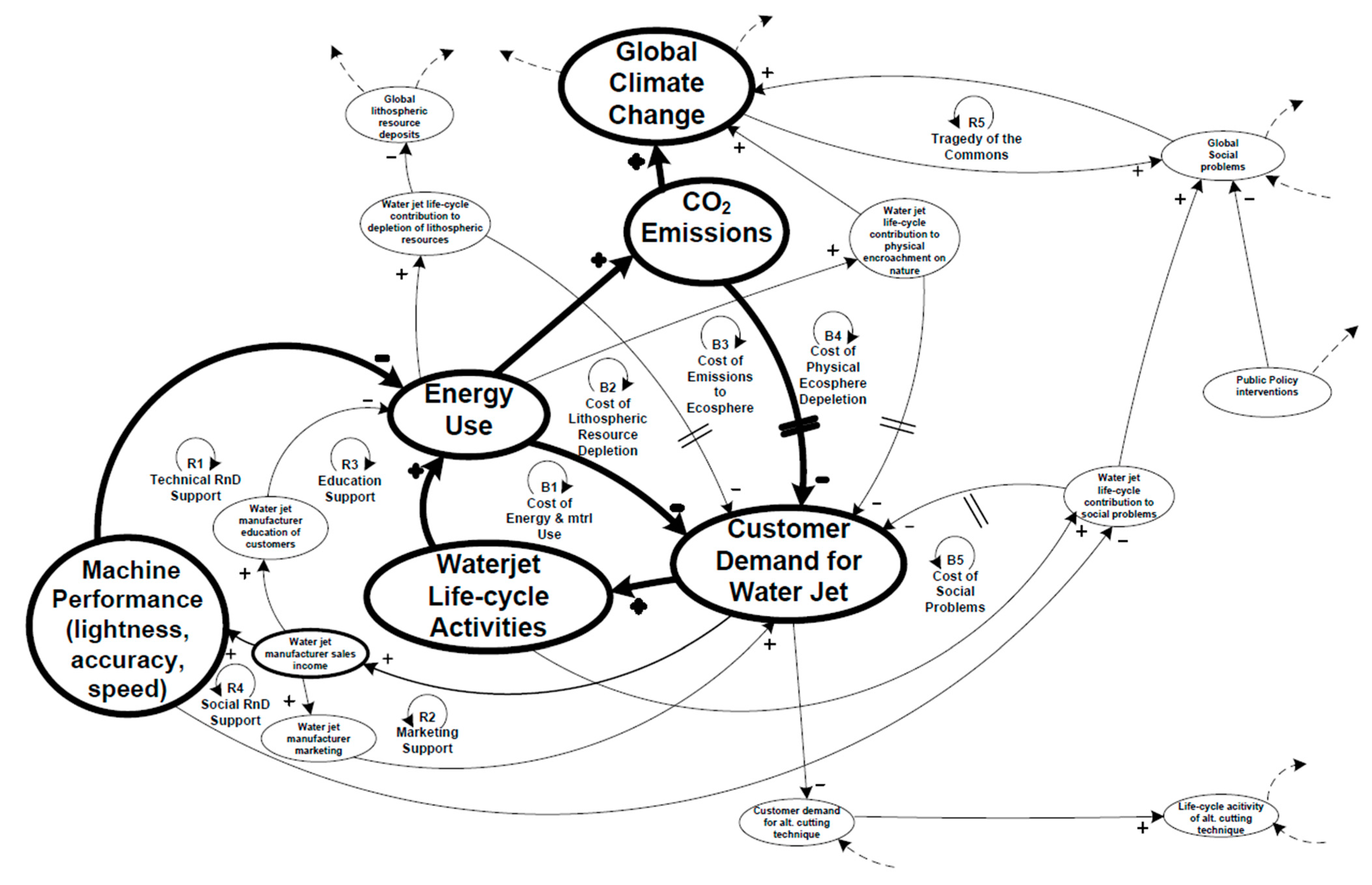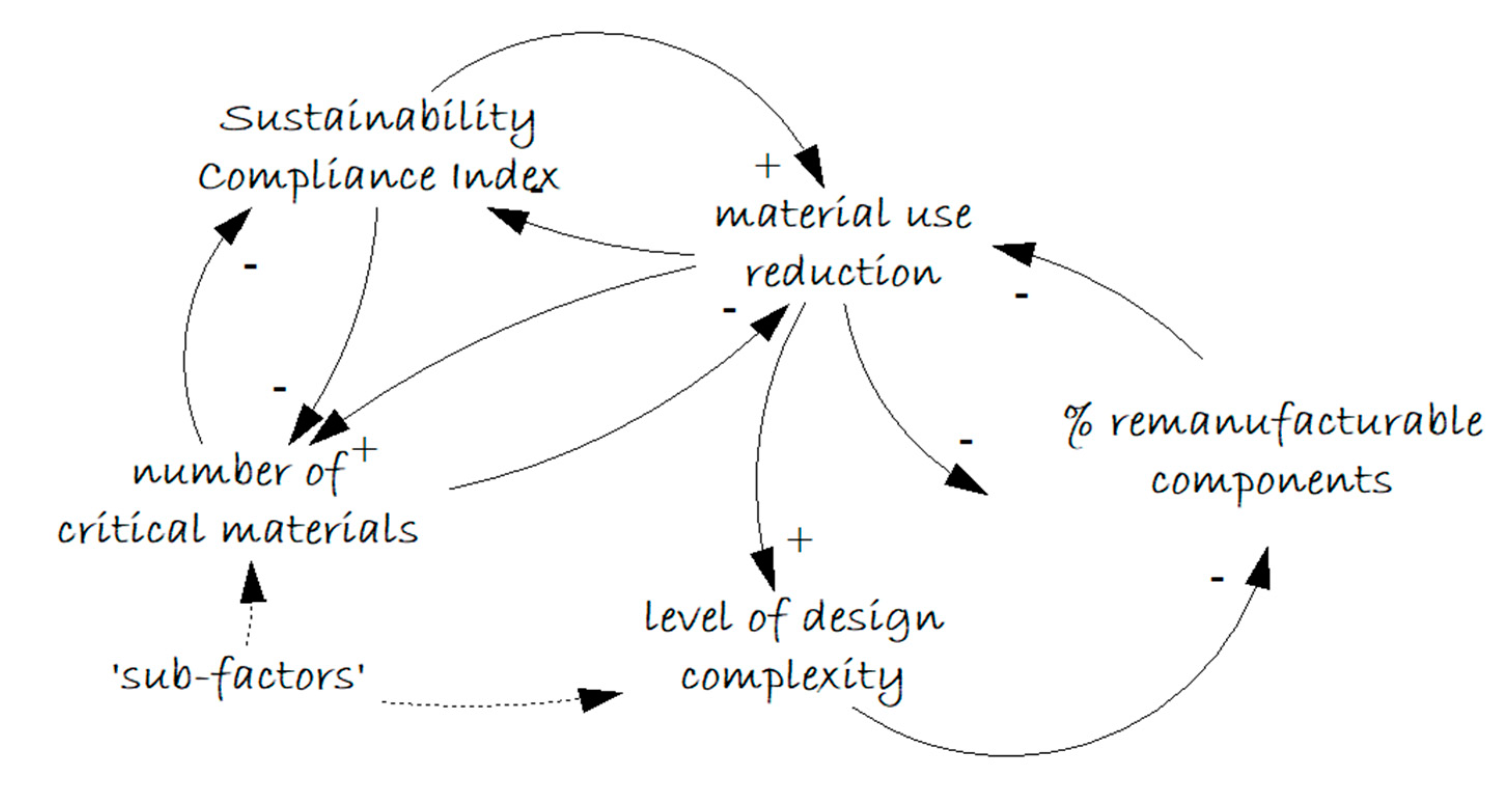Using Group Model Building to Foster Learning for Strategic Sustainable Development
Abstract
1. Introduction
2. Research Approach
2.1. Developing a Theoretical Reference Model for Learning and Achieving Competencies for Strategic Sustainable Development
2.2. Participatory Group Model Building for Strategic Sustainable Development
2.3. Proposed Reference Model
- (i)
- which steps in the ABCD process were conducted,
- (ii)
- which competencies could be indicated through observations and participant feedback, and
- (iii)
- the result of the GMB application and hence type of learning.
3. Cases of Group Model Building in Strategic Sustainable Development Research and Education
3.1. Case 1. Group Model Building Workshop Method for Sustainable Product Design and Development
Analysis of Case 1
3.2. Case 2. Introductory Procedure for Sustainability-Driven Design Optimization
Analysis of Case 2
3.3. Case 3. Transport Strategy and Planning Using System Dynamics and Backcasting from Sustainability Principles
Analysis of Case 3
3.4. Case 4. Group Model Building Applications within Higher Education Courses in Strategic Sustainable Development at Blekinge Institute of Technology
Analysis of Case 4
4. Discussion
4.1. Potential to Foster Key Sustainability Competency Development
4.2. Potential of Fostering Learning for Sustainability
4.3. Limitations and Opportunities for Further Research
5. Conclusions and Outlook
Funding
Acknowledgments
Conflicts of Interest
References
- Lozano, R.; Ceulemans, K.; Alonso-Almeida, M.; Huisingh, D.; Lozano, F.J.; Waas, T.; Hugé, J. A review of commitment and implementation of sustainable development in higher education: Results from a worldwide survey. J. Clean. Prod. 2015, 108, 1–18. [Google Scholar] [CrossRef]
- Steffen, W.; Richardson, K.; Rockström, J.; Cornell, S.E.; Fetzer, I.; Bennett, E.M.; Folke, C. Planetary boundaries: Guiding human development on a changing planet. Science 2015, 347. [Google Scholar] [CrossRef] [PubMed]
- Brundtland, G. Report of the World Commission on Environment and Development: Our Common Future; Document A/42/427; United Nations General Assembly: New York, NY, USA, 1987. [Google Scholar]
- Nikulina, V.; Simon, D.; Ny, H.; Baumann, H. Context-adapted urban planning for rapid transitioning of personal mobility towards sustainability: A systematic literature review. Sustainability 2019, 11, 1007. [Google Scholar] [CrossRef]
- Baumgartner, R.J.; Rauter, R. Strategic perspectives of corporate sustainability management to develop a sustainable organization. J. Clean. Prod. 2017, 140, 81–92. [Google Scholar] [CrossRef]
- Broman, G.I.; Robèrt, K.H. A framework for strategic sustainable development. J. Clean. Prod. 2017, 140, 17–31. [Google Scholar] [CrossRef]
- Horan, D. A new approach to partnerships for SDG transformations. Sustainability 2019, 11, 4947. [Google Scholar] [CrossRef]
- Barth, M.; Michelsen, G. Learning for change: An educational contribution to sustainability science. Sustain. Sci. 2013, 8, 103–119. [Google Scholar] [CrossRef]
- Abd-El-Khalick, F.; Bell, R.L.; Lederman, N.G. The nature of science and instructional practice: Making the unnatural natural. Sci. Educ. 1998, 82, 417–436. [Google Scholar] [CrossRef]
- Brundiers, K.; Wiek, A. Beyond interpersonal competence: Teaching and learning professional skills in sustainability. Educ. Sci. 2017, 7, 39. [Google Scholar] [CrossRef]
- Lozano, R.; Merrill, M.Y.; Sammalisto, K.; Ceulemans, K.; Lozano, F.J. Connecting competences and pedagogical approaches for sustainable development in higher education: A literature review and framework proposal. Sustainability 2017, 9, 1889. [Google Scholar] [CrossRef]
- Sterman, J.D. System dynamics modeling: Tools for learning in a complex world. Calif. Manag. Rev. 2001, 43, 8–25. [Google Scholar] [CrossRef]
- Hjorth, P.; Bagheri, A. Navigating towards sustainable development: A system dynamics approach. Futures 2006, 38, 74–92. [Google Scholar] [CrossRef]
- Stave, K. Participatory system dynamics modeling for sustainable environmental management: Observations from four cases. Sustainability 2010, 2, 2762–2784. [Google Scholar] [CrossRef]
- Maxwell, J.A. Chapter 5. Methods. In Qualitative Research Design: An Interactive Approach; Sage Publications: Thousand Oaks, CA, USA, 2013; Volume Voulme 41. [Google Scholar]
- Seale, C. Quality in qualitative research. Qual. Inq. 1999, 5, 465–478. [Google Scholar] [CrossRef]
- Schreier, M. Qualitative Content Analysis in Practice; SAGE: London, UK; Los Angeles, CA, USA, 2012. [Google Scholar] [CrossRef]
- Annetta, L.A.; Richard Lamb, R.; Vallett, D.; Shapiro, M. Project-based learning progressions: Identifying the nodes of learning in a project-based environment. In Contemporary Technologies in Education; Springer: Berlin/Heidelberg, Germany, 2019; pp. 163–181. [Google Scholar] [CrossRef]
- Ileris, K. Lärande, 2nd ed.; Andersson, S., Ed.; Studentlitteratur: Lund, Sweden, 2007; ISBN 9789144107981. [Google Scholar]
- Meyer, J.H.F.; Land, R. Threshold concepts and troublesome knowledge (2): Epistemological considerations and a conceptual framework for teaching and learning. High. Educ. 2005, 49, 373–388. [Google Scholar] [CrossRef]
- Argyris, C.; Schön, D. Organizational Learning: A Theory of Action Perspective; Addison Wesley: Boston, MA, USA, 1978; ISBN 0201001748. [Google Scholar]
- Kolb, D.A. Experiential Learning: Experience as the Source of Learning and Development; FT Press: Upper Saddle River, NJ, USA, 2014. [Google Scholar]
- Redman, A.; Wiek, A.; Barth, M. Current practice of assessing students’ sustainability competencies—A review of tools. Sustain. Sci. 2020, in press. [Google Scholar] [CrossRef]
- Albareda-Tiana, S.; Ruíz-Morales, J.; Azcárate, P.; Valderrama-Hernández, R.; Múñoz, J.M. The EDINSOST project: Implementing the sustainable development goals at university level. In Universities as Living Labs for Sustainable Development; Springer: Cham, Switzerland, 2020; pp. 193–210. [Google Scholar] [CrossRef]
- Wiek, A.; Withycombe, L.; Redman, A. Key competencies in sustainability: A reference framework for academic program development. Sustain. Sci. 2011, 6, 203–218. [Google Scholar] [CrossRef]
- Glasser, H.; Hirsh, J. Toward the development of robust learning for sustainability core competencies. Sustain. J. Rec. 2016, 9, 121–134. [Google Scholar] [CrossRef]
- Vennix, J.A. Group model-building: Tackling messy problems. Syst. Dyn. Rev. 1999, 15, 379–401. [Google Scholar] [CrossRef]
- Andersen, D.F.; Vennix, J.A.M.; Richardson, G.P.; Rouwette, E. Group model building: Problem structuring, policy simulation and decision support. J. Oper. Res. Soc. 2007, 58, 691–694. [Google Scholar] [CrossRef]
- Ny, H. Strategic Life-Cycle Modeling for Sustainable Product Development. Licentiate Thesis, Blekinge Institute of Technology, Karlskrona, Sweden, 2006. [Google Scholar]
- Watz, M.; Hallstedt, S.I. Group model building with causal loop diagrams to foster capabilities for sustainable design and product development. In Proceedings of the DESIGN 2018 16th International Design Conference, Dubrovnik, Croatia, 26–29 October 2020. [Google Scholar] [CrossRef]
- Byggeth, S.; Ny, H.; Wall, J.; Broman, G.; Robèrt, K.-H. Introductory Procedure for Sustainability-Driven Design Optimization. In Proceedings of the International Conference on Engineering Design, ICED’ 07, Cite des Sciences et de l’industrie, Paris, France, 28–31 August 2007. [Google Scholar]
- Ny, H.; Borén, S.; Nurhadi, L.; Schulte, J.P.M.; Robèrt, K.-H.; Broman, G. Vägval 2030—Färdplan för Snabbomställning Till Hållbara Transporter; (No. diva2:1 089 430); Blekinge Tekniska Högskola: Karlskrona, Sweden, 2017. [Google Scholar]
- Waldron, D.; Leung, P. Strategic leadership towards sustainability: A master’s program on sustainability. Ind. Ecol. 2009, 6. [Google Scholar] [CrossRef]
- Missimer, M.; Connell, T. Pedagogical approaches and design aspects to enable leadership for sustainable development. Sustainability 2012, 5, 172–181. [Google Scholar] [CrossRef]
- Hallstedt, S.; Thompson, A. Integrating Sustainability and Innovation through a Master’s Program in Product-Service Systems. In Proceedings of the Conference ERSCP & EMSU, Delft, The Netherlands, 25–29 October 2010. [Google Scholar]
- Watz, M.; Hallstedt, S.I. Profile model for management of sustainability integration in engineering design requirements. J. Clean. Prod. 2020, 247, 119155. [Google Scholar] [CrossRef]
- Watz, M.; Hallstedt, S.I. Integrating sustainability in product requirements. In DS 92: Proceedings of the DESIGN 2018 15th International Design Conference; The Design Society: Glasgow, Scotland, 2018; pp. 1405–1416. [Google Scholar] [CrossRef]
- Hallstedt, S.I. Sustainability criteria and sustainability compliance index for decision support in product development. J. Clean. Prod. 2017, 140, 251–266. [Google Scholar] [CrossRef]
- Broman, G.; Robèrt, K.H.; Collins, T.J.; Basile, G.; Baumgartner, R.J.; Larsson, T.; Huisingh, D. Science in support of systematic leadership towards sustainability. J. Clean. Prod. 2017, 140, 1–9. [Google Scholar] [CrossRef]
- Ny, H. Strategic life-cycle modelling and simulation for sustainable product innovation. Prog. Ind. Ecol. 2009, 6, 216–242. [Google Scholar] [CrossRef]
- Ayers, J. Competence literate but context lacking? Investigating the potential of study abroad programs to promote sustainability competence acquisition in students. Sustainability 2020, 12, 5389. [Google Scholar] [CrossRef]
- Lotz-Sisitka, H.; Wals, A.E.; Kronlid, D.; McGarry, D. Transformative, transgressive social learning: Rethinking higher education pedagogy in times of systemic global dysfunction. Curr. Opin. Environ. Sustain. 2015, 16, 73–80. [Google Scholar] [CrossRef]
- Sánchez-Carracedo, F.; Ruiz-Morales, J.; Valderrama-Hernández, R.; Muñoz-Rodríguez, J.M.; Gomera, A. Analysis of the presence of sustainability in higher education degrees of the Spanish university system. Stud. High. Educ. 2019. [Google Scholar] [CrossRef]



| Sustainability Competency | Examples of Related Concepts | Teaching Methods or Methodologies |
|---|---|---|
| Systems thinking | Variables, indicators, sub-systems, adaption feedback loops, causality, decisions, structures, multiple domains-social, ecological, technological, economic, values, needs | Qualitative and quantitative modelling, systems analysis, participatory modeling |
| Anticipatory | Time, dynamics, non-linearity, uncertainty, probability, possibility, risk, dependency, desirability | Scenario methods, forecasting, backcasting, participatory modelling |
| Normative | Sustainability principles, goals, targets, thresholds, responsibility, justice, safety, damage, harm, reinforcement, trade-offs. | Comparative multicriteria assessments, risk analysis, sustainability assessments, participatory methods |
| Strategic | Intentionality, transformation, transitions, governance, strategies, success, viability, feasibility, efficiency, effectiveness, obstacles, dependency, synergies | Decision-support methods, organizational change management, learning methods |
| Interpersonal | Collaboration, group dynamics, leadership, empathy, motivation | Teamwork methods, participatory methods |
| Case | Contribution to Sustainability Competencies | Type of Learning Loop | Type of Learning | ‘ABCD Steps’ | GMB-Steps |
|---|---|---|---|---|---|
| 1 | Systems thinking, Anticipatory, Normative, Interpersonal | Single | Collaborative, accommodative | AB | 1–3 |
| 2 | Systems thinking, Anticipatory, Normative, Strategic, Interpersonal | Double | Collaborative, accommodative | ABCD | 1–5 |
| 3 | Systems thinking, Anticipatory, Normative, Strategic, Interpersonal | Double | Collaborative, transformative | ABCD | 1–5 |
| 4 | Systems thinking, Anticipatory, Normative, Strategic | Single | Collaborative, accommodative | AB | 1–3 |
© 2020 by the author. Licensee MDPI, Basel, Switzerland. This article is an open access article distributed under the terms and conditions of the Creative Commons Attribution (CC BY) license (http://creativecommons.org/licenses/by/4.0/).
Share and Cite
Watz, M. Using Group Model Building to Foster Learning for Strategic Sustainable Development. Sustainability 2020, 12, 8350. https://doi.org/10.3390/su12208350
Watz M. Using Group Model Building to Foster Learning for Strategic Sustainable Development. Sustainability. 2020; 12(20):8350. https://doi.org/10.3390/su12208350
Chicago/Turabian StyleWatz, Matilda. 2020. "Using Group Model Building to Foster Learning for Strategic Sustainable Development" Sustainability 12, no. 20: 8350. https://doi.org/10.3390/su12208350
APA StyleWatz, M. (2020). Using Group Model Building to Foster Learning for Strategic Sustainable Development. Sustainability, 12(20), 8350. https://doi.org/10.3390/su12208350





